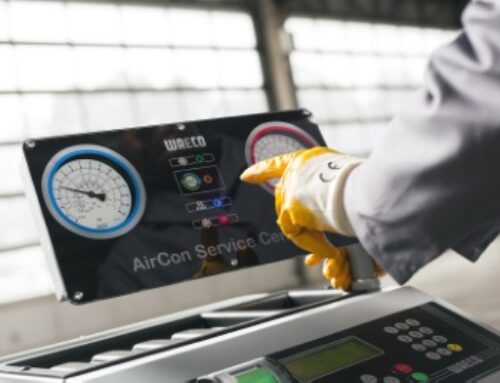AdBlue: busting the myths with Certas
 AdBlue distributor Certas Energy Lubricants has provided guidance for operators regarding the procurement and handling of the fluid.
AdBlue distributor Certas Energy Lubricants has provided guidance for operators regarding the procurement and handling of the fluid.
With the drive to improve air quality in UK towns and cities and impending introduction of clean air zones, the haulage industry is under pressure to reduce emissions, points out Certas – and AdBlue has proven to be a leading technology for reducing harmful nitrogen oxide (NOx) emissions.
“However, roadside tests carried out by the Driver and Vehicle Standards agency revealed that 1 in 13 lorries in the UK are fitted with emission cheat devices,” added the company.
“Some of these illegal devices switch off the use of AdBlue, which is stored next to the diesel fuel tank, disabling the warning light on the dashboard which would alert the driver that the AdBlue system was not functioning.
“As a result, the stated maximum emission levels are exceeded. Cases have even been reported of hauliers claiming they were not aware they needed to use AdBlue – a basic operational requirement for operating Euro 5 and Euro 6 vehicles.”
The company went on to address a series of frequently asked questions about AdBlue, including to tackle what it said were some common misconceptions about the fluid:
Why do I need AdBlue and will I need it in the future?
“If your engines are fitted with SCR catalysts, you will need AdBlue in order to meet the standards for Euro 5 and Euro 6 diesel emissions. Although Euro 5 emission standards could be met with other technologies, Euro 6 standards require the use of selective catalytic reduction with AdBlue.
“Based on current developments in engine technology, diesel powered vehicles will still need AdBlue in the future as emission legislation becomes more demanding.”
Is AdBlue hazardous?
“There are no known hazardous properties of AdBlue. In fact, the main raw material urea occurs naturally in the human digestive system. However, it is corrosive and can dissolve materials that are not listed as AdBlue-proof in ISO 22241.”
How much AdBlue do I need?
“Consumption depends on the type of vehicle and application but the average use of AdBlue vs diesel for tricks is between four and eight per cent.”
What should I look for when choosing AdBlue?
“AdBlue is a clear, colourless liquid. There are cheaper alternatives available on the market, but to ensure you’re using a product that meets the required standard, always ensure you purchase your AdBlue from a VDA licensed partner and ensure the label mentions ISO 22241 compliance.”
What happens if I run out of AdBlue?
“It’s critical that you keep your engine topped up with AdBlue and that you have an emergency supply available at all times. Not only could running out result in hefty fines, it could also prevent your engine from starting at all.
“Your engine would not be damaged from running out of AdBlue but it could affect performance and mean that it could be exceeding legal emission limits.”
What should I do if I spill any AdBlue?
“A small spill should be diluted with water, mopped up and flushed down a drain. In the event of a larger spill, contain it using sand or a spill kit and dispose of it appropriately. It’s not necessary to wear protective clothing when dispensing AdBlue but be mindful that it can cause stains to clothes or upholstery.”
Why is it important to keep AdBlue clean?
“Any contamination can cause damage to the SCR catalyst and limit its effectiveness. When dispensing AdBlue, never add it to the diesel tank, always put it directly in its dedicated tank and make sure the dispensing device is clean of any dirt or grime.
“AdBlue should be stored in dedicated equipment between -6º and 25º to maintain a minimum shelf life of 18 months.”
What should I do if I put diesel in the AdBlue tank or vice versa?
“The AdBlue tank is easy to recognise as it has a blue cap or AdBlue label on it. However, as its often fitted near the diesel cap there are often cases of the two being mixed up. In the event of either case, do not switch on your engine.
“If you have put AdBlue in your diesel tank, you should empty the whole tank and discard the mixture. If diesel is added to the AdBlue tank you will need to contact your vehicle manufacturer, as running the engine with polluted AdBlue will disrupt the SCR system.”
Certas Energy Lubricants’ AdBlue is ISO 22241 compliant and is available in a variety of formats including jerry cans, IBCs and bulk. The company also supplies a range of dispensing equipment including electric pumps, hand pumps and IBC dispensers.
www.certasenergy.co.uk/lubricants











